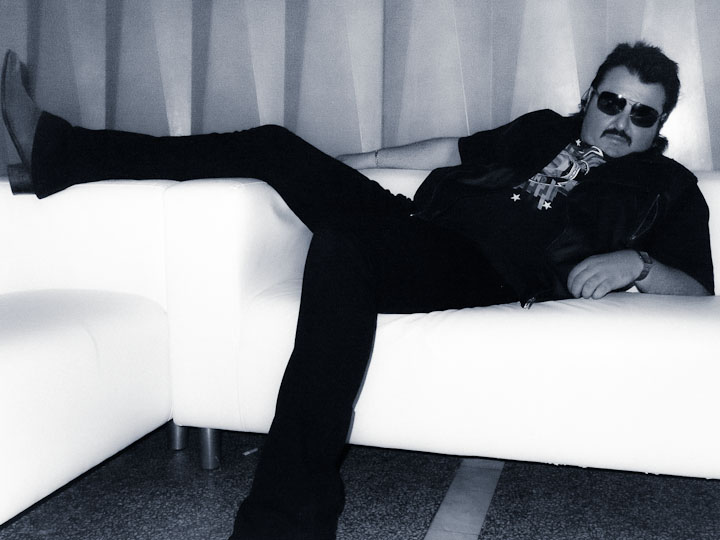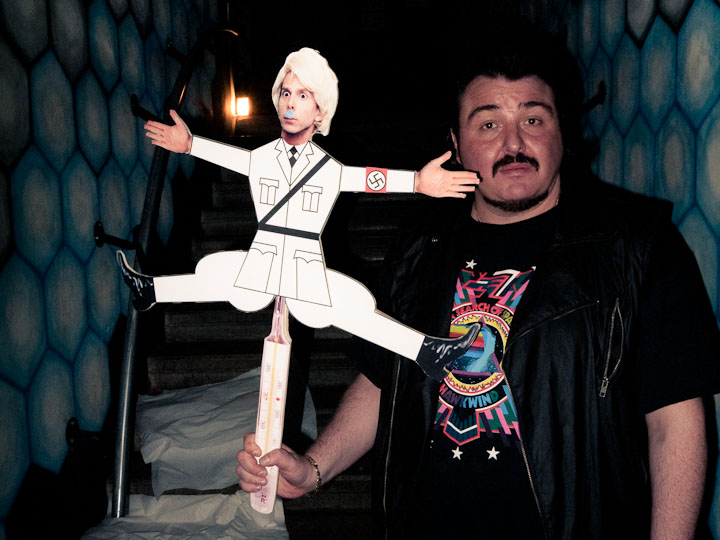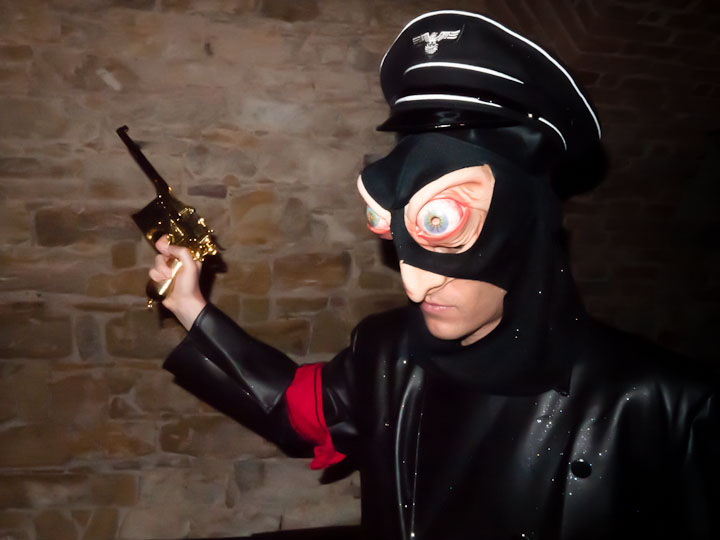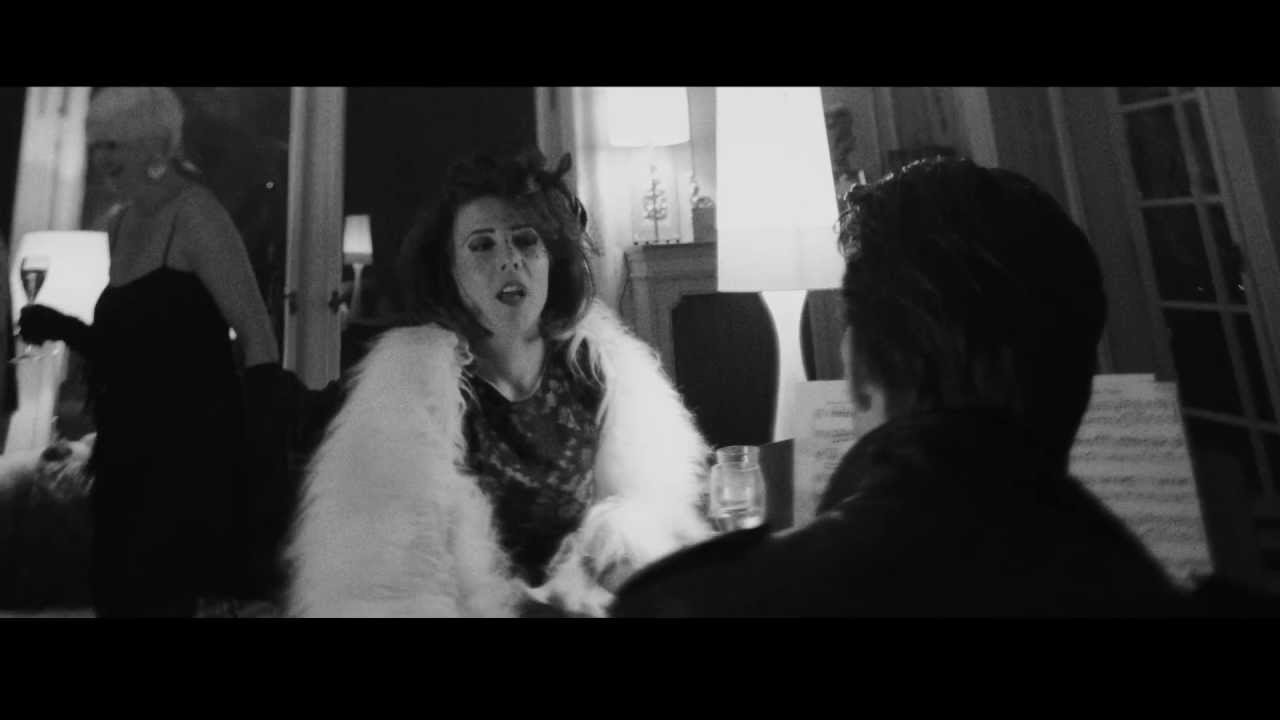In the corridors of Prague’s Roxy Club, there’s a man disguised as a monkey carrying a crucified Jesus Banana. In the backstage area, another fellow – this one dressed in an ugly pastiche of a Nazi officer’s uniform – is waving a replica golden gun, a mask with distended, bloodshot eyes and a monstrous nose covering the upper half of his face. He interrupts his marching practice to introduce himself as Adolf Glittler. Down the steps, in the venue itself, a giant banner hangs above the stage with the word ‘Disco’ written in Gothic German script, and almost at the front stands a table with lit candles, carved wooden boxes and bottles of unidentifiable liquids. There’s a man there too, chanting and waving his arms in a madcap fashion, occasionally ceremonially splashing the contents of his bottles onto the carpeted portion of stage around him. Suddenly, as though he’s a Greek waiter entertaining tourists, he throws a plate down into the auditorium, where it smashes in front of me. Then, without even a glance in my direction, he returns to his incantations.
This is not the climax of tonight’s show. That honour is instead reserved for the gentleman who is now on the lip of the stage and togged out in a garish Hawkwind T-shirt, a sleeveless black leather jacket, black jeans and brand new, expensive cowboy boots.
“I like the rock stars from Communist East Germany,” he’ll happily brag. “You must have big balls, a moustache and a mullet. Many hipsters now have moustache, but they don’t have mullet, because they don’t have balls.”
This, ladies and gentlemen, is Bruno Ferrari, and it’s time to welcome you to his new musical offensive: Disco Fever In The Third Reich.
A word of warning, however: this is only the soundcheck for the party to launch his brand new album, Vaudeville. There may be countless more folk wandering around in a variety of similarly questionable costumes, and the bar staff may already be brandishing joints, but tonight’s show is still hours away. The aggressive sorcerer is in fact only there to bless the stage and, having completed his work, he’ll decant generous measures of one of the unidentified fluids into two shot glasses, pass one to Bruno, and they’ll both knock them back with relish. Then he’ll leave the venue, never to be seen again. Bruno Ferrari, you’ll soon understand, is not a man to do things by halves, and nor is he afraid of proving that.
“We think,” he tells me calmly when I ask him to explain the theme for the event, “’What if Adolf Hitler were born now and were pop star?’ We think about how fascists and skinheads have very stupid music, so everything’s in cycles. And this story is about how, after 500 years, Adolf is born new, but his name will be Glittler, and he will be disco star. He will fight with disco. Nazi movement was mutated with disco. He will take whole world by disco.”
We’re sitting in a restaurant next door to the club, and the conversation has already taken such a weird turn that I barely even bat an eyelid at the fact that, behind us, the waiters are feeding piranha in a giant fish tank.

“This show I’m going to see tonight,” I muse aloud, “sounds like it may be a little tasteless. Have you encountered any resistance?”
“This club where we playing today: Jewish club,” he says gravely. “And we don’t know it before. And somebody say, “We must make more anti-fascist”. So instead of Reich Eagle, we make Reich Chicken. A fascist chicken.”
He nods seriously, then takes a slug from his first beer of the day. It’s early afternoon.
”Hey!” he adds excitedly. “Today we wanted to sell on the show the Pretzel like Swastika. We want to find some baker who will make it. And I ask everybody and I say, ‘This is anti-fascist music,’ and everybody told me, ‘I have problem with this. This is bad idea.’ And I say, ‘What is bad idea? Anti-fascist or Swastika pretzel?’”

These, you’re about to discover, are the kinds of issues Bruno Ferrari is on this earth to raise.
So, yeah: who is Bruno Ferrari? In a nutshell, Bruno Ferrari is a half Czech, half Iraqi, furry love machine with four albums of darkly humoured, 80s influenced electro-pop under his cummerbund. A cult legend in the Czech Republic for many years – “One million people know me,” he claims, “but one million people hate me” – he’s recorded songs with titles like ‘Tongue In Heaven’, ‘Japanese Bondage’, ‘Innocent Moustache Prisoner’ and ‘I’m Your Steak’. Parts of his latest album, Vaudeville, were co-produced and mixed by John Fryer, who worked with the likes of Depeche Mode and Cocteau Twins and was the co-founder of This Mortal Coil with Ivo Watts-Russell, and he also teams up on three songs with Moimir Papalescu, currently collaborating with Devo’s Gerald Casale in Die Alten Maschinen. Despite being almost entirely unknown beyond his country’s borders, Bruno Ferrari clearly carries a lot more weight than even his expanding girth might suggest, and his appeal, he claims, is simple.

“Some people hate me because they don’t understand me, but they are afraid of everything they don’t understand. Much more young people like it. I don’t know why, but young people are cool. I am like funny father for them, and for the older I am like young boy. Much people have inside Bruno Ferrari, you know, this guy who can fuck everybody who he want, who can do everything he want. Everybody has it.”
“Not everyone shows it, though,” I point out.
“And I show how you can show it,” he grins.
Inevitably, there’s a complicated story behind Bruno Ferrari. For starters, though this may come as little surprise, it’s not his real name. Bruno was in fact born Samir Hauser, and if ever a man has inadvertently earned the title “A True Son Of Communism” it is he: his mother was a spy for the Communist Party in Czechoslovakia, sent to Iraq to live with a high ranking officer in the Iraqi army working as a spy for the same cause. Their cover was that they were in love, and indeed they were soon married. But to truly convince the authorities that their marriage was no sham, they concocted a plan: that plan became Samir. They fled to Czechoslovakia just before the outbreak of war between Iran and Iraq, and though his origins were not revealed to Samir until later in his life – he’s now 39 – he seems to have spent most of the last two decades rebelling against the powers that be, causing trouble in the Czech Republic as a provocative performer under a variety of guises.
“If I speak about him with people I know, I don’t think there’s one that don’t like him, who is not appreciating the way he does everything to the edge now,” says Jan Muchow, founder of Ecstasy of St Theresa, who – following 1989’s Velvet Revolution – became the first Czech act to be signed to a UK label after John Peel picked up on their debut album. He’s known Samir since they moved in the same circles in the late 1980s, back when Samir played in Chinatown, one of the country’s first bands to be influenced by the likes of Joy Division and Gang Of Four.
“He’s intelligent and he’s funny,” Jan continues. “I know people for whom he is like a hero. He has real hardcore fans, and for them he’s just like a god. I’ve seen shows where he would piss on the first row from the stage and they would be like, ‘What a gift!’”
Such shows took place after Samir became part of Vanessa, a brutal EBM act – the country’s first – who released their debut album in 1994 and who reformed in 2009 with their second album, Ave Agony, produced by Einsturzende Neubauten’s Alexander Hacke. They were named after porn star Vanessa Del Rio, and in typically extravagant style their reunion was preceded by a grim trailer alluding starkly to masturbation and hardcore pornography that somehow, to this day, remains available on Youtube.
Samir has also previously flirted with Europop in a somewhat irreverent hunt for the pink Koruna as one half of 2 Amigos, whose style seemed to blend Benetton with Marc Almond. (“They promise me girls and money,” he explains. “I was young and horny. But I was stupid: it was homosexual label.”) He’s even earned enough of a reputation to be cast in a Czech TV advertisement for sausages. No one accused him of selling out.
But, once again, who exactly is Bruno Ferrari? Bruno Ferrari is a grotesque parody of popular music’s most decadent, carnal desires, a Viagra-fuelled synthesis of Tom Jones, Barry White, David Hasselhoff and every other licentious, lascivious pop star, lounge singer or oversexed icon capable of inspiring the hurling of underwear to a stage. His music meanwhile locates the beating hearts of Yello, Georgio Moroder, Nine Inch Nails and Andy Kaufman’s alter ego, Tony Clifton, then devours them in some perverse, sexual ritual. In fact, as it happens, the name was indeed initially adopted for morally unsettling purposes.
“He called me up at six in the morning,” Jan Muchow remembers, “and said, ‘I would like to know your opinion: I have to go to this porn casting and I have to choose a porn name.’ He gave me about five names, and one of them was Bruno Ferrari. And I said, ‘Of course that’s the one.’”
Whether his porn career was successful or not – I didn’t ask – the name gave birth to one of the most confusing, controversial creations of Samir’s life, something that had already caused more than its fair share of fuss. In the years since, Bruno’s four albums have straddled the divide between absurdly brilliant and painfully cheesy like an overweight man trying to ride a carthorse. By the time I met him back in 2005, he was releasing his second album, Man Fatal, and already playing to packed houses in Prague, his backing vocalists waving metre long dildos in the air in a way that would make Madonna blush. (The aftershow shenanigans were, I have to add, second to none.) Meanwhile, his website – written in broken English – offered an advice page where he suggested that condoms were merely a collusion between governments and industry designed to fleece the masses of their money and keep oil companies in business. Its tone, like everything with which Bruno is associated, was hard to fathom.
The thing about Samir – or should I say Bruno? – is that it’s almost always impossible to tell where his real personality ends and the act begins. The first time we ever met, accompanied by his musical director, David N. Jahn, he brought a man he introduced as his bodyguard (though he was later revealed to be his cousin) and another, apparently his on-the-road doctor (who was soon unmasked as a friend along for the ride). And, though he sometimes drops his guard backstage, there frequently remains an element of Bruno in his extravagant behaviour.

“He’s like the actor Sacha Baron-Cohen, because they are similar in this absurd sense of humour,“ Muchow contends. “There’s no, ‘That’s too much.’ With Samir, he lives the way he is at these stages. So he can be quite hardcore, and then go back and say, ‘No’ to everything, and then go over the top with everything. He has my respect.”
“I hate to be Samir, so I make Bruno,” the man himself confesses. “I make all interviews like Bruno so people don’t know who is Bruno and who is Samir. Because you know I am Gemini, and I am half Iraqi and half Czech, and Bruno is my therapy.”
His phone rings constantly as we talk. John Fryer, who’s flown in to perform on one song tonight, has just left with his tattooed Scandinavian girlfriend. Friends keep dropping by and wishing him luck. I squeeze in another question, asking him why he doesn’t want to be Samir.
“Because Samir is shiny boy,” he laughs, though there’s an oddly melancholic hollowness within.
“And you want your dark side to come out?” I press.
“Yes,” he replies. “This hedonist style of Bruno is my Mr Hyde. Samir is more Dr Jekyll.”
I point out that, soon after we first met, he claimed that he remained Bruno even behind closed doors.
“Because it was six years ago and I take much coke,” he chuckles conspiratorially. “Now I’m older and I must control a little bit more.”
He fiddles with the gold chain around his neck.
“But your wild side still exists?” I persist.
“Something in me wants to get out. I don’t know what it is. I want to be a good boy, a good hero, but something every time goes wrong.“
And it’s true. Samir soon gets elbowed out of the way by Bruno as discussion turns to the level of his profile.
“Now we have big promo in Czech Republic,” he boasts, “and people knows it. First album was very, very underground, and we was young. Young? I was 32 years. But I have this problem now: people say, ‘I love you, we love you, come to my town!’ And I say, ‘Fuck You! Why you not come here six years ago?’”
In further pursuit of the reality of his success, I ask if he lives comfortably from his music.
“No,” he concedes. “I make some money, but all the money I spent to buy some shit for show. Drugs is very expensive, nice pussy is expensive. Gold is cheaper.”

If you think he’s sailing close to the wind, you’d better brace yourself. In order to top up his income, Bruno is currently offering himself as an escort. The prices are high, the opportunities – ahem – flamboyant: 300 Euros gets you a “Golf outing with Bruno”, while 500 Euros buys you the “Birthday Party with Bruno”. Rather wonderfully – in possible homage to John Lurie’s cult TV show – he also offers “Fishing with Bruno” for only 250 Euros, and there’s an “Introduction Bruno as your husband or boyfriend – to your friends or parents (including: autograph signing, formal speaking, funny stories telling, lunch, Bruno will interesting talks about you, how you are great, how he loves you, how he meet you first time, promising, kissing, good impression and noble style, Bruno with roses)”. This comes in at 500 Euros.
The highest price, however, is 1000 Euros, and for that you’re offered the dubious pleasures of an “Anal exorcism – only for women (including: autograph signing, formal speaking, Bruno will speak badly to your devil, Bruno will kick out devil from your asshole, Bruno esoteric speaking, dinner)”. I ask him if business is going well.
“Everybody wants discount,” he replies. “I will make special package: anal exorcism and funeral party.”
My politically correct inclinations don’t know which way to look. It’s a feeling that always becomes swiftly familiar whenever we cross paths, and it lies at the root of my fascination with the man. Much people have inside Bruno Ferrari, you know.
Breaking taboos, of course, is not always justification for poor taste. Winking at your audience is also similarly ineffective if your intentions are not clear. Taken alone, many of the antics that take place at Bruno’s salacious, combative show could easily be deemed disagreeable, at the very least. But, as is his custom, Bruno lays it on so thick it’s tough to see his performance as anything other than overblown and outrageous. He’s rolled on stage in a wheelchair, dressed as the Karate Kid – the image of a blue and white pill adorning the back of his red jacket – and immediately tosses wine into his audience. He prowls the stage like a tiger, inviting audience members to light his cigarettes, chewing his gums relentlessly, while dancers twist beside him, sometimes dressed in white PVC bodices and shorts, at other times recalling Charlotte Rampling in The Night Porter. He brings on a man who pours a carrier bag’s worth of white powder onto a table and then snorts it up with an elephant’s trunk strapped to his face. He leads on a woman with long hair obscuring her entire face, turns her round to reveal John Lennon’s bespectacled eyes strapped to her naked buttocks, and then has her arse mime to a reimagined version of ‘Imagine’ while a man dressed as a satyr looks on. There’s also a woman dressed in a zebra print gimp suit, Weimar Republic burlesque dancing, and Bruno is at one point arrested and escorted from the stage by Adolf Glittler. There’s obviously little point in taking this seriously: Bruno has simply pinpointed show business’ greatest strengths, corrupted them and then employed them for his own evil ends. Most impressively, however, and – despite a goatee that resembles a slug crawling under his chin – Bruno manages to convince everyone present that he is indeed an object of significant desire.
“Do you take this seriously?” I ask him that afternoon. “Should we take it seriously?”
“What is seriously?” he replies. “This is very difficult question. You make something for it, so this is seriously. But if I mean seriously, that is different. I don’t take life seriously because life is comedy, you know…”
“But you did tell me once – though, as chance would have it, I didn’t know if you were serious – that what you do is art,” I remind him. “Do you still think it’s art?”
“Yes, it’s some kind of art,” Bruno insists. “I don’t know which kind, but art is if you know something what somebody doesn’t know and you show it. It’s to show people something strange, something new. I think this is art…”
In many ways, Bruno is simply revealing the subtext of most pop music by taking it to an extreme: its latent sexual obsession, its exploitative methods, its shallow, glossy puerility. Both his audience and the crowd backstage afterwards are populated by females clearly delighting in this caricature, and his girlfriend admits that she’s been a fan since she was sixteen. But what makes Bruno troubling is that he inhabits the role so consummately it could be thought that he believes such conduct is acceptable. He concedes that not everybody is able to get to grips with what he’s doing.
“I have many problems on street. They say “Fucking redneck!” Also, they don’t like gold, like necklaces. They are afraid of love machines now. But somebody must take the old times to this time.”
So your role is to bring the love machine into the 21st Century?
“We have one song, ‘20th Century Man’, it’s about this. German scientist in future make übermensch, but he find only one brain in the store, and this brain is from 20th Century man. It is man with moustache and mullet and he smell like sweat. And they have only this brain and they put it in übermensch. In these lyrics, ‘It’s never too late for miracles!’ I’m here! Eat my sweat! Smell my sweat!”

If this sounds preposterous, so indeed does Vaudeville’s music, which some might dismiss as Eurotrash but which offers more depth than that suggests, thanks in part to David N. Jahn’s impressive production and composition skills. “You’re wondering who I am/ God or some kind of harlequin”, Bruno growls on ‘20th Century Man’, his vocals strangled as an intense beat throbs behind him and layers of synth build towards the kind of impressive climax that Flash Gordon-era Queen might have attempted had they been produced by Vangelis. ‘Latino Lover’ is a lush but dirty mixture of The Human League and Pet Shop Boys, while ‘Black Lingerie’ is a glam stomp built for a fetish disco and ‘Dáma Při Těle’ a (presumably unauthorised) semi-chanson cover of Lee Hazlewood’s ‘Four Kinds Of Lonely’ whose new title translates loosely as ‘Chubby Lady’. ‘King Kong’, a cover of a Czech 80s band called Abraxas, is a dark electro-pop anthem powered by synth drums, and ‘Missionary Man’ – a goofy tune that leans on some of the most vulgar sounds favoured by 80s pop, including synthetic church bells and bursts of wailing electric guitar – opens with the lines, “Not so quickly/ I’m a missionary man/ I don’t want to do a doggie style/ Just face to face /How Lord commanded."
With ‘I Am Your Steak’ he takes things even further, his tale of flesh-eating love set to an incongruous backing that recalls the torch songs – like ‘The Rhythm Divine’ and ‘Moon On Ice’ – which Yello recorded for 1987’s One Second. “I’m a piece of meat for a special lady,” Bruno croons, to which his backing vocalist responds simply, “Yummy yummy.” In its original form, a sample of convicted German cannibal Armin Meiwes gave away the fact that the song shares its inspiration with Rammstein’s ‘Mein Teil’, but this has now been replaced by Robert Mitchum’s pivotal speech from The Night Of The Hunter.
“I have moustache and mullet and I love woman,” he explains of the last minute change. “It’s better for this music. Because this cannibal sounds a little homosexual for me.”
“And that’s a problem?” I query.
“Yeah,” he argues. “Because Bruno can’t eat man. I’m no homophobe, but I have moustache and mullet and I love woman.”
That’s been clear since the very start. 2003’s ‘Pornoženich’ – also known as ‘Condom Baby’, and whose video was filmed in a Prague sex shop and stars a middle aged, greasy-haired, buck-toothed deviant, a dancing Catholic priest, a budget Metal Mickey and a shop assistant shot with an arrow in the eye by a flabby cherub – features a line that translates as “I have a condom on my heart." ‘Tongue In Heaven’, the opening track on Man Fatal, begins with the sound of an electric razor, a stifled grunt, and a smutty compliment – “Now you look very good, baby” – before Bruno and his backing vocalists salute “Addiction! Addiction!/ Sweet swamp… Your kinky jelly/ My tongue in heaven." Then there’s ‘Lovers in Danger’, the title track of his third album, which drapes the song in instrumentation that calls unexpectedly upon his Middle Eastern roots while those brave backing vocalists announce “We fuck the sky!/ By the shaft of light/ We fuck the sky!/ We go wild!” And, on the frankly bizarre ‘Cowboy Dreams’, he tells a story of a man who “didn’t use any deodorants, no parfums” and is confronted by a “holy angel” who “looks something between David Hasselhoff and Amanda Lear” and tells him, “Good looking is a full time job." Only Bruno Ferrari can make this stuff up.
After the show, as admirers mingle with musicians, and bouncers operate tight security at the backstage entrance, Bruno asks if I can help him break into the English market. I remind him that I’m a writer living abroad, and that, even though I spent years working with record labels, I’m not in a position to offer him much advice. He’s frustrated: he’s clearly eager to move beyond the confines of his own land. So I ask him what he’d do for the English market. Would he make any changes to his appearance?
“Yes,” he declares decisively. “Much more hair gel. They like it, I think, London girls. And much sweat. They like to smell my sweat, I think. Because it’s aphrodisiac, you know?”
So if you take a woman back to your place and you want to seduce her, would you put on your own record?
“Yes,” he nods firmly. “One hundred times.”
And would you dance for her?
“Yes, of course. “ He looks at me like I’m stupid. “And I make spa for her, a Jacuzzi, with my sweat.”
And does she stay the night, or does she leave?
“She’s in bondage.”
And do you ever let her go?
“Yes, yes. But they like it.”
Because Bruno is the master?
"Yes," Bruno proclaims as a man dressed as a cheese moon walks past. "Bruno is the Sweat Master.”
And this – ludicrous, severe, unreadable to the last – is Bruno Ferrari. Make sense of him if you can, but never forget one thing: much people have inside Bruno Ferrari…







